人教版小学英语六年级上册知识点
人教版(PEP)小学英语六年级上册知识点归纳

人教版(PEP)小学英语六年级上册知识点归纳Unit 1: How Can I Get There?In this unit。
we will learn some XXX.1.Key Words:Museum: a place where you can see art。
historical objects。
and other XXX.Bookstore: a shop where you can buy books.Cinema: a place where you can watch movies.XXX: to change n.Hospital: a place where people go to get medical treatment.Left: the opposite of right.Post office: a place where you can send letters and packages.Science: the study of the natural world.Right: the opposite of left.Straight: without XXX.Crossing: a place where two or XXX.eful Phrases:Post office: "Where is the post office?"Science museum: "Where is the science museum?"Pet hospital: "Where is the pet hospital?"XXX: "Where is XXX?"XXX: "Where is Beihai Park?"Palace Museum: "Where is the Palace Museum?"Go straight: "Go straight and you will see the bookstore on your left."Turn right/left: "Turn right at the crossing and you will see the hospital on your right."Next to: "The cinema is next to the bookstore."In front of: "The school is in front of the park."Near the park: "XXX is near the park."XXX: "XXX."mon ns:Excuse me: "Excuse me。
六年级上册英语人教版重点知识
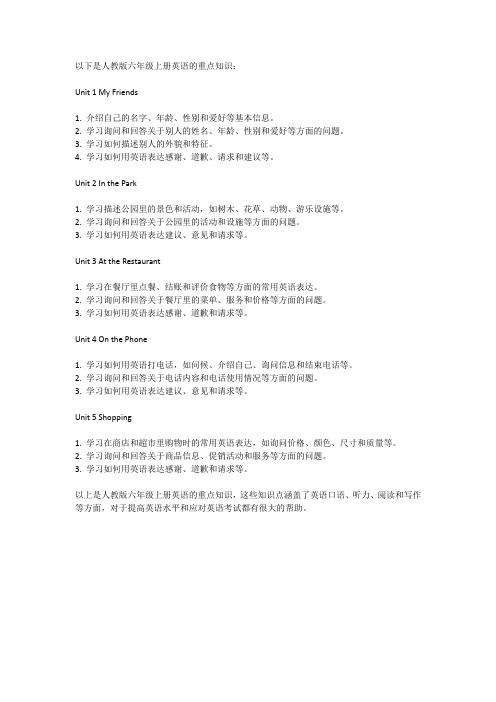
以下是人教版六年级上册英语的重点知识:
Unit 1 My Friends
1. 介绍自己的名字、年龄、性别和爱好等基本信息。
2. 学习询问和回答关于别人的姓名、年龄、性别和爱好等方面的问题。
3. 学习如何描述别人的外貌和特征。
4. 学习如何用英语表达感谢、道歉、请求和建议等。
Unit 2 In the Park
1. 学习描述公园里的景色和活动,如树木、花草、动物、游乐设施等。
2. 学习询问和回答关于公园里的活动和设施等方面的问题。
3. 学习如何用英语表达建议、意见和请求等。
Unit 3 At the Restaurant
1. 学习在餐厅里点餐、结账和评价食物等方面的常用英语表达。
2. 学习询问和回答关于餐厅里的菜单、服务和价格等方面的问题。
3. 学习如何用英语表达感谢、道歉和请求等。
Unit 4 On the Phone
1. 学习如何用英语打电话,如问候、介绍自己、询问信息和结束电话等。
2. 学习询问和回答关于电话内容和电话使用情况等方面的问题。
3. 学习如何用英语表达建议、意见和请求等。
Unit 5 Shopping
1. 学习在商店和超市里购物时的常用英语表达,如询问价格、颜色、尺寸和质量等。
2. 学习询问和回答关于商品信息、促销活动和服务等方面的问题。
3. 学习如何用英语表达感谢、道歉和请求等。
以上是人教版六年级上册英语的重点知识,这些知识点涵盖了英语口语、听力、阅读和写作等方面,对于提高英语水平和应对英语考试都有很大的帮助。
人教版小学六年级上册英语知识点归纳
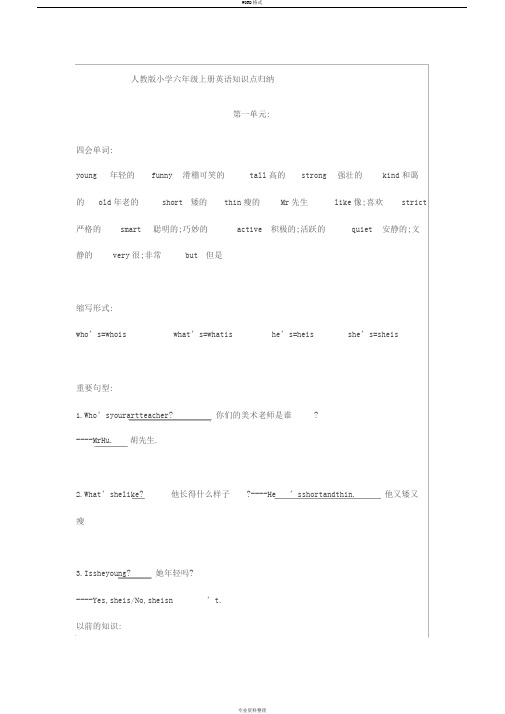
人教版小学六年级上册英语知识点归纳第一单元:四会单词:young 年轻的funny 滑稽可笑的tall高的strong 强壮的kind和蔼的old年老的short 矮的thin瘦的Mr先生like像;喜欢strict 严格的smart 聪明的;巧妙的active 积极的;活跃的quiet 安静的;文静的very很;非常but 但是缩写形式:who’s=whois what’s=whatis he’s=heis she’s=sheis重要句型:1.Who’syourartteacher? 你们的美术老师是谁?----MrHu. 胡先生.2.What’shelike? 他长得什么样子?----He ’sshortandthin. 他又矮又瘦3.Issheyoung? 她年轻吗?----Yes,sheis/No,sheisn ’t.以前的知识:Ihavea new math teacher. 我有一个新数学老师.(小学三年级已经学过Ihaveapen.)注意:划线部分可以替换.第二单元:四会单词:Monday 星期一Tuesday 星期二Wednesday 星期三Thursday 星期四Friday 星期五Saturday 星期六Sunday 星期日day天;日子have有;吃on 在⋯⋯时候too 也;太短语:dohomework 做作业watchTV 看电视readbooks 读书Whatabout? ......怎么样?dohousework做家务playcomputergames 玩电脑游戏重点句型:1.Whatdayisittoday? 今天星期几?—It’sMonday.星期一.2.WhatdowehaveonMondays? 星期一我们有什么课? —WehaveEnglish,science,computer and P.E.我们有英语课,科学,计算机跟体育课.3.WhatdoyoudoonSaturdays? 星期六你干什么?(具体的某一天前用介词on,在具体的时间前,用介词at)—Ioftendomyhomework. 我通常做家庭作业.4.Whataboutyou? 你呢?—Idomyhomework,too. 我也是做家庭作业.第三单元:四会单词:eggplant 茄子fish 鱼greenbeans 青豆tofu 豆腐potato 土豆tomato 西红柿for 为;给lunch 中餐;午饭we 我们tasty 好吃的;可口的sweet 甜的sour 酸的fresh 新鲜的salty 咸的favourite 最喜爱的;特别喜爱的fruit 水果grape 葡萄缩写形式:they’re=theyare don’t=donot重点句型:1.Whatwouldyoulikeforlunch? 你午餐想吃什么?-----I ’dlikesometomatoesandmutton. 我想吃一些西红柿跟羊肉.2.What’syourfavouritefruit? 你最喜欢的水果是什么?------/Ilikeapples. 我喜欢苹果.3.Idon’tlikegrapes. 我不喜欢葡萄.4.Bananasaremyfavourite. 我最喜欢香蕉.第四单元一.单词:emptythetrash 倒垃圾cookthemeals 做饭watertheflowers浇花sweepthefloor 扫地cleanthebedroom 打扫卧室makethebed 铺床setthetable摆餐具washtheclothes 洗衣服dothedishes 洗碗碟putawaytheclothes 收拾衣服can’t=cannot(不会;不能)useacomputer (使用计算机)二.句子:1.I’mhelpful! Icansweepthefloor 。
人教版PEP三起小学英语六年级上册知识点总结

人教版PEP三起小学英语六年级上册知识点总结Unit1 How can I get there?一、重点单词和短语Science科学museum博物馆post office邮局bookstore书店cinema电影院hospital医院tasty美味的,可口的London Eye伦敦眼stomach胃crossing十字路口turn left/turn right向左/右转go straight=walk straight直走next to紧挨着/与……相邻far from(离……远)near在……附近behind(在……后面)in front of(在……前面)between…and…(在…和…之间)二、重点句子1.How do you go to school? 你是怎样去上学的?2.where is the restaurant? 餐馆在哪里?3. Usually I go to school on foot. 我通常走路去上学。
4. Sometimes I go by bike. 有时候我骑自行车去。
5.问路之前,出于礼貌,我们要说“Excuse me”与后面的句子要用标点符号隔开。
6.Look at the traffic lights, remember the traffic rules. 看着交通灯,记住交通规则。
7.Stop at a red light.Wait at a yellow light. Go at a green light.红灯停。
黄灯等一等。
绿灯行。
8.Red means stop, yellow means wait, green means go. 红色的意思是停止,黄色的意思是等待,绿色的意思是通行。
9.How can I get to the park? 我该怎样到达公园呢?10.You can go by the No.15 bus. 你可以坐15路公交车去。
小学英语六年级上册人教版第一单元复习
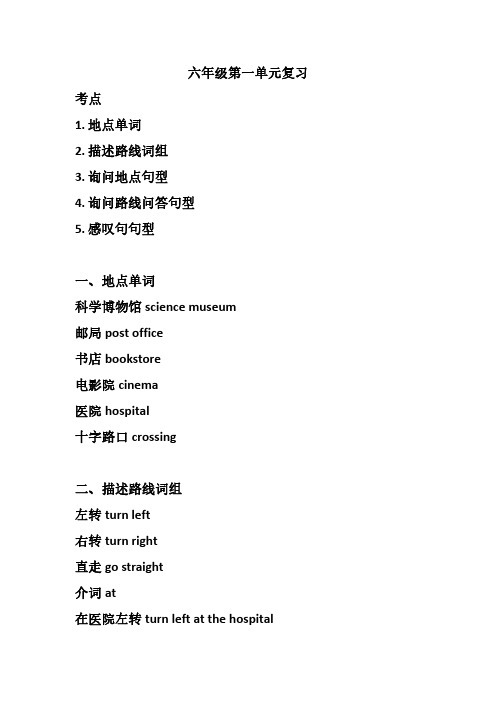
六年级第一单元复习考点1.地点单词2.描述路线词组3.询问地点句型4.询问路线问答句型5.感叹句句型一、地点单词科学博物馆science museum邮局post office书店bookstore电影院cinema医院hospital十字路口crossing二、描述路线词组左转turn left右转turn right直走go straight介词at在医院左转turn left at the hospital在邮局左转turn left at the post office在书店右转turn right at the bookstore在电影院右转turn right at the cinema在十字路口直走go straight at the crossing二、询问地点句型句型问:Where is+地点?答:It's+方位介词+地点.1.医院在哪?在电影院旁边。
Where is the hospital?It’s near the cinema.2.电影院在哪?紧挨着科学博物馆。
Where is the cinema?It’s next to the science museum.3.书店在哪?在邮局的前面。
Where is the bookstore?It’s in front of the post office.三、询问路线句型句型问:How can+主语+get there?How can+主语+get to+地点?答:Turn right/Turn left/go straight+at+地点.1.我们如何到达那儿?How can we get there?2.我如何到达那儿?How can I get there?3.我如何到科学博物馆?How can I get to the science museum?4.我如何到学校?How can I get to school?5.我们如何到达电影院?How can we get to the cinema?6.我们如何到达邮局?How can we get to the post office? 7.我们如何到家?How can we get home?四、感叹句句型句型结构What a/an+形容词+名词!1.多么有趣的电影啊!What an interesting film!2.多么棒的博物馆啊!What a great museum!3.多么漂亮的房间呀!What a nice room!。
小学六年级英语上册各单元知识点汇总(人教版)
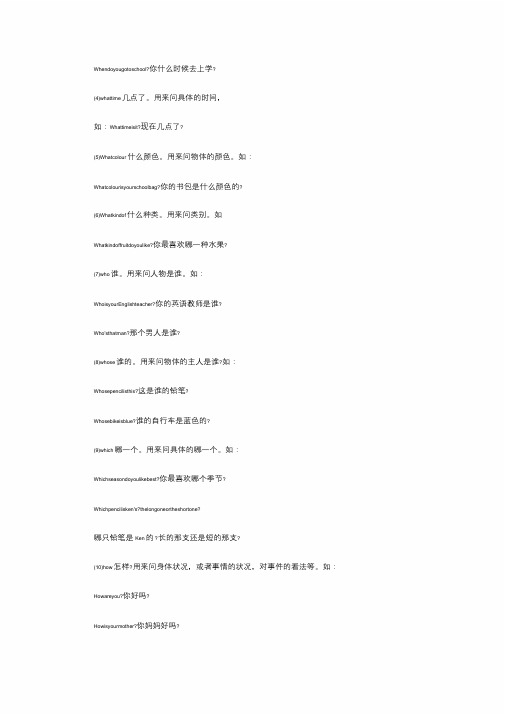
Whendoyougotoschool?你什么时候去上学?(4)whattime几点了。
用来问具体的时间,如:Whattimeisit?现在几点了?(5)Whatcolour什么颜色。
用来问物体的颜色。
如:Whatcolourisyourschoolbag?你的书包是什么颜色的?(6)Whatkindof什么种类。
用来问类别。
如Whatkindoffruitdoyoulike?你最喜欢哪一种水果?(7)who谁。
用来问人物是谁。
如:WhoisyourEnglishteacher?你的英语教师是谁?Who'sthatman?那个男人是谁?(8)whose谁的。
用来问物体的主人是谁?如:Whosepencilisthis?这是谁的铅笔?Whosebikeisblue?谁的自行车是蓝色的?(9)which哪一个。
用来问具体的哪一个。
如:Whichseasondoyoulikebest?你最喜欢哪个季节?Whichpencilisken's?thelongoneortheshortone?哪只铅笔是Ken的?长的那支还是短的那支?(10)how怎样?用来问身体状况,或者事情的状况,对事件的看法等。
如:Howareyou?你好吗?Howisyourmother?你妈妈好吗?(11)howmany多少个。
用来问有多少个,后面要跟名词的复数形式。
如:Howmanybooksdoyouhave?你有多少本书?Howmanykitescanyousee?你能看见多少只风筝?(12)howmuch多少钱。
用来问物体的价钱。
如:Howmucharethey?他们多少钱?Howmuchisyourschoolbag?你的书包多少钱?(13)howold几岁了。
用来问年龄。
如Howoldareyou?你几岁了?Howoldisyourfather?你爸爸多大了?(14)why为什么。
用来问原因,一般要用because来答复。
人教版PEP小学英语六年级上册重点句型及语法知识汇总

人教版PEP小学英语六年级上册重点句型及语法知识汇总Unit 1 How can I get there?重点单词XXX。
post office邮局,XXX。
XXX。
XXX。
crossing十字路口。
turn left左转。
turn right右转。
gostraight直走。
map地图。
compass指南针。
GPS全球定位系统。
stars星星。
XXX意大利餐厅。
getto到达。
重点句型1.---Where is the restaurant?餐厅在哪里?It’s next to the park on Dong fang Street.它在东方路,在公园附近。
2.---How can we get there?我们怎么去哪里?XXX left XXX.书店左转,然后病院右转。
3.He now has GPS.他现在有GPS。
4.What an interesting film!何等风趣的片子!方位词复:XXX紧挨着,near在。
邻近,XXX在。
背面,XXX在。
旁边,in front of在。
前面。
Unit 2 Ways to go to school重点单词on foot走路。
by bike骑车。
by bus乘公交。
by train乘火车。
XXX乘地铁。
by ship搭船。
by XXX乘飞机。
slow down 慢下来。
XXX交通灯。
traffic rules交通划定规矩。
go/come to school上学。
by sled坐雪橇。
byferry坐轮渡。
pay n to留意。
traffic lights交通灯。
and wait at a red light红灯停等一等。
slow downand。
at a yellow light黄灯减速并停下。
Go XXX。
重点句型1.---How do you come to school?你怎么上学?----Usually。
I come on foot.通常我走路来的。
人教版人教版小学英语六年级上册知识点归纳图文稿
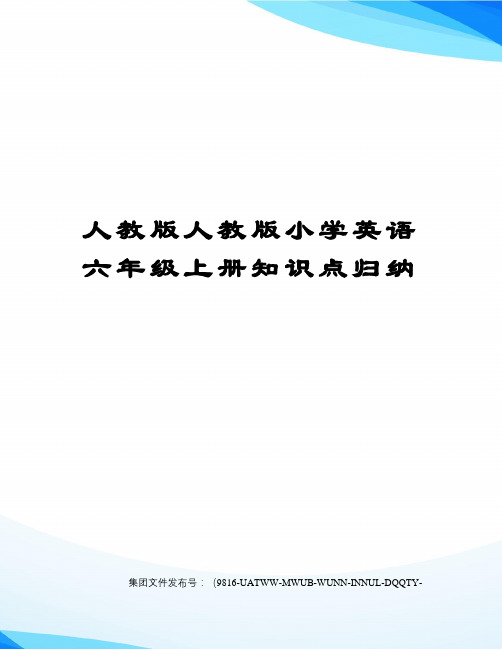
人教版人教版小学英语六年级上册知识点归纳集团文件发布号:(9816-UATWW-MWUB-WUNN-INNUL-DQQTY-人教版(PEP)小学英语总复习六年级上册知识点Unit1Howcan I get there一、主要单词:museum博物馆 bookstore书店 cinema电影院 turn 转弯 hospital医院 left向左 post office 邮局 science科学right向右straight笔直地 crossing十字路口二、习惯语搭配:post office邮局 science museum科学博物馆 pet hospital宠物医院Italian restaurant意大利餐馆 Beihai Park北海公园 Palace Museum 故宫博物院 go straight直走 turn right/left右/左转 next to挨着in front of...在...前面 near the park在公园附近 on Dongfang Street在东方大街上三、惯用表达式:Excuse me 打扰一下 Follow me, please!请跟着我!四、公式化句型:1、问路的句型及其答语:问句:Where is the + 地点?···在哪儿?答语:It’s + 表示地点的词语。
它···。
2、询问怎么到某地的句型及其答语:问句:How can +主语 + get (to)+地点···怎么到···同义句型:Can you tell me the way to +地点Where is + 地点Which isthe way to +地点答语:Turn +方向+表示地点的介词短语。
···转。
五、例句:Whereisthecinema,please请问电影院在哪里?It’snexttothehospital. 它与医院相邻。
人教版(PEP)小学英语六年级上册全册知识点(含作文)
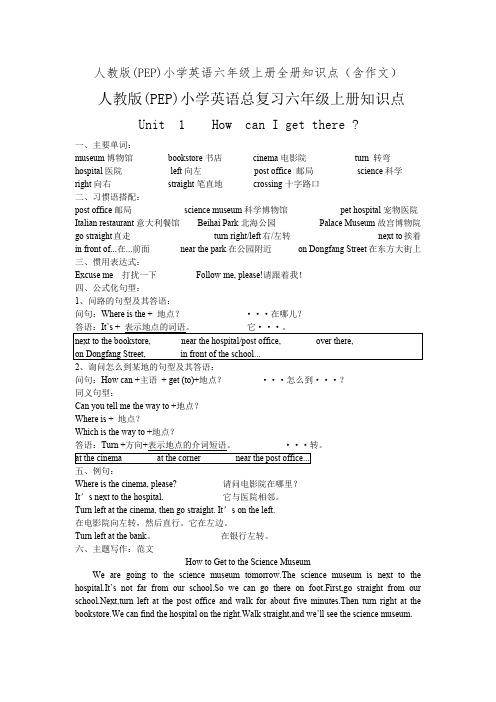
人教版(PEP)小学英语六年级上册全册知识点(含作文)人教版(PEP)小学英语总复习六年级上册知识点Unit 1 How can I get there ?一、主要单词:museum博物馆bookstore书店cinema电影院turn 转弯hospital医院left向左post office 邮局science科学right向右straight笔直地crossing十字路口二、习惯语搭配:post office邮局science museum科学博物馆pet hospital宠物医院Italian restaurant意大利餐馆Beihai Park北海公园Palace Museum故宫博物院go straight直走turn right/left右/左转next to挨着in front of...在...前面near the park在公园附近on Dongfang Street在东方大街上三、惯用表达式:Excuse me 打扰一下Follow me, please!请跟着我!四、公式化句型:1、问路的句型及其答语:问句:Where is the + 地点?···在哪儿?答语:It’s + 表示地点的词语。
它···。
next to the bookstore, near the hospital/post office, over there,on Dongfang Street, in front of the school...2、询问怎么到某地的句型及其答语:问句:How can +主语+ get (to)+地点?···怎么到···?同义句型:Can you tell me the way to +地点?Where is + 地点?Which is the way to +地点?答语:Turn +方向+表示地点的介词短语。
人教版(PEP)小学英语六年级上册各单元知识点归纳(三年级起点)
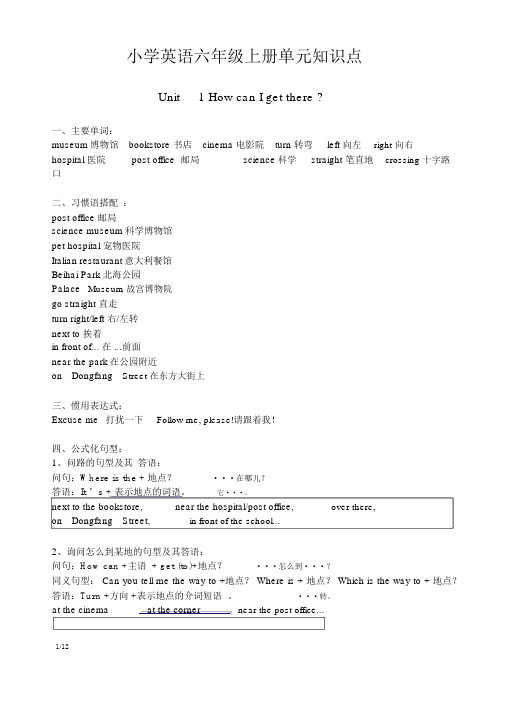
小学英语六年级上册单元知识点Unit 1 How can I get there ?一、主要单词:museum博物馆bookstore 书店cinema 电影院turn 转弯left 向左right 向右hospital 医院post office 邮局science科学straight 笔直地crossing 十字路口二、习惯语搭配:post office 邮局science museum科学博物馆pet hospital 宠物医院Italian restaurant意大利餐馆Beihai Park 北海公园Palace Museum 故宫博物院go straight 直走turn right/left 右/左转next to 挨着in front of... 在 ...前面near the park在公园附近on Dongfang Street 在东方大街上三、惯用表达式:Excuse me打扰一下Follow me, please!请跟着我!四、公式化句型:1、问路的句型及其答语:问句:Where is the + 地点?···在哪儿?答语:It ’s + 表示地点的词语。
它···。
next to the bookstore,near the hospital/post office,over there,on Dongfang Street,in front of the school...2、询问怎么到某地的句型及其答语:问句:How can +主语 + get (to)+地点?···怎么到···?同义句型: Can you tell me the way to +地点? Where is + 地点? Which is the way to + 地点?答语:Turn +方向 +表示地点的介词短语。
人教版小学英语六年级上册知识清单(全)

人教版小学英语六年级上册知识清单(全)小学英语六年级(上)单元必备知识清单Unit1 How Do You Go There?一、重点单词及短语:by经......,乘...... / foot脚(复数feet)/bike自行车/ bus公共汽车/train火车/plane飞机/ship轮船/subway地铁/how怎样,如何/go to school去上学/then然后/traffic交通/traffic light交通灯/traffic rule交通规则/stop停/wait等/get to到达/country国家(复:countries)drive驾驶/England英国/Australia澳大利亚/if如果/must必须/know知道※频度副词:always总是(100%)>usually通常(80%)>often通常(60%)>sometimes 有时候(40%)>hardly ever几乎不(20%)>never决不,从不(0%)※同音异义词:1.by经......,乘....../ buy购买/bye再见2.know知道/no不※反义词:different不同的—same相同的right右边的—left左边的二、重点句型:1、How do you go to school,Sarah?你怎么去上学,萨拉?2、Usually I go to school on foot.=I usually go to school on foot.我通常走路去上学。
3、Sometimes I go(to school) by bike.起地 comic book漫画书 post card明信片 newspaper报纸 magazine杂志 dictionary字典(复:dictionaries) shoe store鞋店 fruit stand 水果摊 pet shop宠物商店 need需要 plant(名)植物;(动)种植 else 其他一、重点句型:1.What are you going to do on the weekend?周末你打算干什么?2.I’m going to visit my grandparents this weekend.我打算这周末去看望我的(外)祖父母。
人教版小学英语六年级年级上所有单词及知识点整理

Unit 1 Our Teachers课文中出现的单词及短语:basketball [ˈb ɑ:sk ɪtb ɔ:l] 篮球 favourite [ˈfe ɪv ər ɪt] 最喜欢的 subject [ˈs ʌbd ʒɪkt] 科目 science [ˈsa ɪəns] 科学 the Mid-autumn Festival 中秋节 mooncake ['mu:nke ɪk] 蛋糕reunion [ri:ˈju:ni ən] 团圆 grandmother [ˈgr ænm ʌðə(r)] (外)祖母 grandfather [ˈgr ænf ɑ:ðə(r)](外)祖父 parrot [ˈp ær ət] 鹦鹉noisy [ˈn ɔɪzi] 嘈杂的 goldfish [ˈg əʊldfɪʃ] 金鱼句型:What does sb look like? 提问外貌 Who is your favourite teacher ? How old is she/he?Unit 2 Months of a Year课文中出现的单词及短语:Art Festival 艺术节Music Festival 音乐节sunshine [ˈsʌnʃaɪn] 阳光harvest [ˈhɑ:vɪst] 收割spring [sprɪŋ]春天summer [ˈsʌmə] 夏天autumn [ˈɔ:təm] 秋天winter [ˈwɪntə] 冬天Christmas [ˈkrɪsməs] 圣诞节New Year 新年Spring Festival 春节Mother‘s Day 母亲节Children‘s Day 儿童节Tree-planting Day 植树节sometimes [ˈsʌmtaɪmz] 有时geese [gi:s] goose[gu:s]的复数形式鹅in+月份在某月on +具体时间在某天句型:When is the school trip?When is your birthday? My birthday is on 月+序数词.Unit 3 Our Hobbies课文中出现的单词及短语:on weekends 在周末listen to music 听音乐usually [ˈju:ʒuəli] 通常casual [ˈkæʒuəl] 随便的,非正式的on the Internet 上网句型:Do you have any hobbies?Yes, I do. I like ….. 或者My hobby is ……What’s your hobby?My hobby is ……What is sb doing ……? sb is+动词ingUnit 4 Around Our City课文中出现的单词及短语:email ['i:meɪl] 邮件up and down上上下下on the right/left 在右边/左边Thanksgiving Day 感恩节pumpkin [ˈpʌmpkɪn] 南瓜句型:How do we go sw?By bus/taxi……How does he/her go to work/school……? By bus/taxi……Where is the bookstore/cinema….?Unit 5 Our Holiday Plans课文中出现的单词及短语:practice [ˈpræktɪs] 练习wheat [wi:t] 小麦go fishing 去钓鱼(类似词组:go shopping/skating/hiking/swimming)句型:What are you going to do? I’m going to …..?选文背诵:。
人教版小学英语六年级上册考点梳理
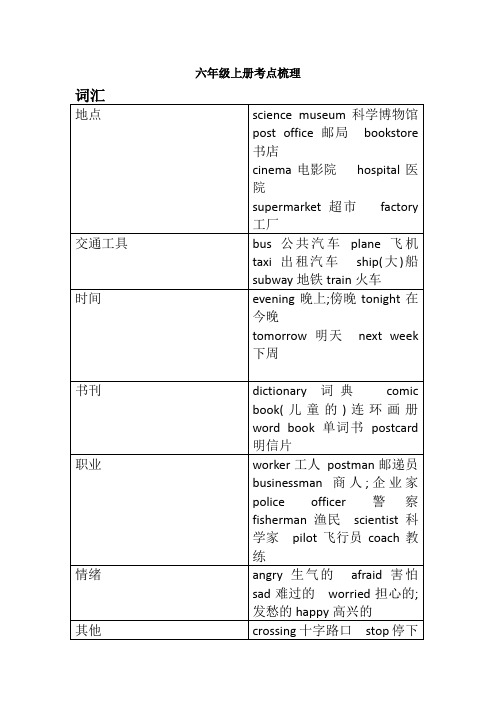
1.He is worried/angry/afraid/sad/happy.他担心/生气/害怕/难过/高兴。
2.一What&ather is ill.你爸爸病了。
3.He should see a doctor this morning.他今天早上应该去看病。
tomorrow明天next week下周
书刊
dictionary词典comic book(儿童的)连环画册word book单词书postcard明信片
职业
worker工人postman邮递员businessman商人;企业家police officer警察fisherman渔民scientist科学家pilot飞行员coach教练
六年级上册考点梳理
词汇
地点
science museum科学博物馆post office邮局bookstore书店
cinema电影院hospital医院
supermarket超市factory工厂
交通工具
bus公共汽车plane飞机taxi出租汽车ship(大)船subway地铁train火车
时间
evening晚上;傍晚tonight在今晚
一I’m going to have an art lesson.我要上美术课。
2.一Where are you going?你们打算去哪儿?
一We’re going to the cinema.我们打算去电影院。
3.一When are you going?你们什么时候去?
一Next Wednesday.下星期三。
4.Don't be sad.别伤心。
5.一How does dad feel now?爸爸现在感觉怎样?
人教版小学六年级上册英语知识点【各单元】
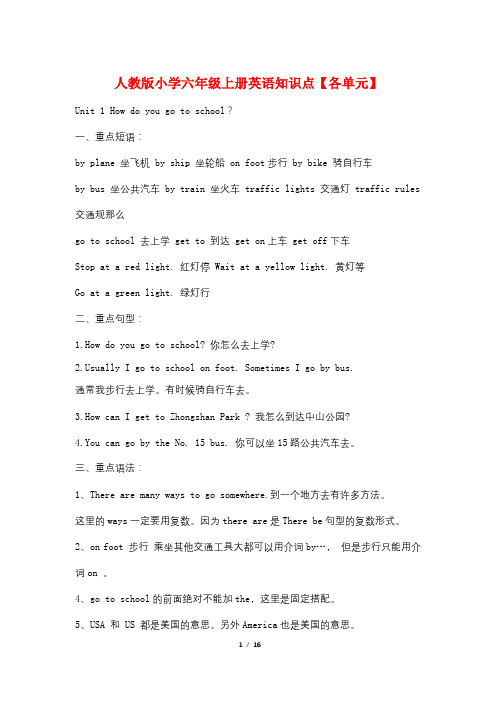
人教版小学六年级上册英语知识点【各单元】Unit 1 How do you go to school?一、重点短语:by plane 坐飞机 by ship 坐轮船 on foot步行 by bike 骑自行车by bus 坐公共汽车 by train 坐火车 traffic lights 交通灯 traffic rules 交通规那么go to school 去上学 get to 到达 get on上车 get off下车Stop at a red light. 红灯停 Wait at a yellow light. 黄灯等Go at a green light. 绿灯行二、重点句型:1.How do you go to school? 你怎么去上学?ually I go to school on foot. Sometimes I go by bus.通常我步行去上学。
有时候骑自行车去。
3.How can I get to Zhongshan Park ? 我怎么到达中山公园?4.You can go by the No. 15 bus. 你可以坐15路公共汽车去。
三、重点语法:1、There are many ways to go somewhere.到一个地方去有许多方法。
这里的ways一定要用复数。
因为there are是There be句型的复数形式。
2、on foot 步行乘坐其他交通工具大都可以用介词by…,但是步行只能用介词on 。
4、go to school的前面绝对不能加the,这里是固定搭配。
5、USA 和 US 都是美国的意思。
另外America也是美国的意思。
6、go to the park 前面一定要加the. 如果要去的地方有具体的名字,就不能再加the ,如果要去的地方没有具体名字,都要在前面加the. ( go to school 除外。
)7、How do you go to …?你怎样到达某个地方?如果要问的是第三人称单数,那么要用:How does he/she…go to …?8、反义词:get on(上车)---get off(下车) near(近的)—far(远的) fast(快的)—slow(慢的)because(因为)—why(为什么) same(相同的)—different(不同的)9、近义词:see you---goodbye sure---certainly---of course10、频度副词:always 总是,一直 usually 通常 often经常 sometimes 有时候 never 从来不针对练习I.中英互译:boat_________ taxi_______ motorbike _______ bus _______地铁轮船飞机火车附近走路骑单车上学because_______ by car _______ sometimes________ often________II.用in,on,under,by,near填空。
人教版小学六年级上册英语知识点各单元
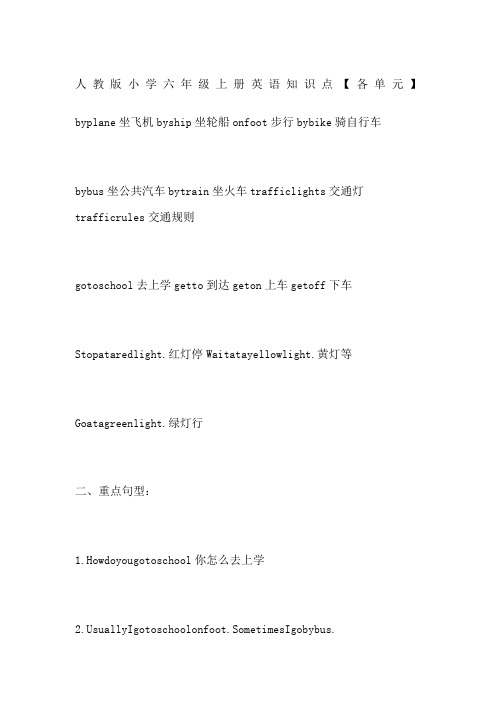
人教版小学六年级上册英语知识点【各单元】byplane坐飞机byship坐轮船onfoot步行bybike骑自行车bybus坐公共汽车bytrain坐火车trafficlights交通灯trafficrules交通规则gotoschool去上学getto到达geton上车getoff下车Stopataredlight.红灯停Waitatayellowlight.黄灯等Goatagreenlight.绿灯行二、重点句型:1.Howdoyougotoschool你怎么去上学uallyIgotoschoolonfoot.SometimesIgobybus.通常我步行去上学。
有时候骑自行车去。
3.HowcanIgettoZhongshanPark我怎么到达中山公园4.YoucangobytheNo.15bus.你可以坐15路公共汽车去。
三、重点语法:1、Therearemanywaystogosomewhere.到一个地方去有许多方法。
这里的ways一定要用复数。
因为thereare是Therebe句型的复数形式。
2、onfoot步行乘坐其他交通工具大都可以用介词by…,但是步行只能用介词on。
4、gotoschool的前面绝对不能加the,这里是固定搭配。
5、USA和US都是美国的意思。
另外America也是美国的意思。
6、gotothepark前面一定要加the.如果要去的地方有具体的名字,就不能再加the,如果要去的地方没有具体名字,都要在前面加the.(gotoschool除外。
)7、Howdoyougoto…你怎样到达某个地方如果要问的是第三人称单数,则要用:Howdoeshe/she…goto…8、反义词:geton(上车)---getoff(下车)near(近的)—far(远的)fast(快的)—slow(慢的)because(因为)—why(为什么)same(相同的)—different(不同的)9、近义词:seeyou---goodbyesure---certainly---ofcourse10、频度副词:always总是,一直usually通常often经常sometimes有时候never 从来不针对练习I.中英互译:boat_________taxi_______motorbike_______bus_______地铁轮船飞机火车附近走路骑单车上学because_______bycar_______sometimes________often________ II.用in,on,under,by,near填空。
六年级英语人教上册重点
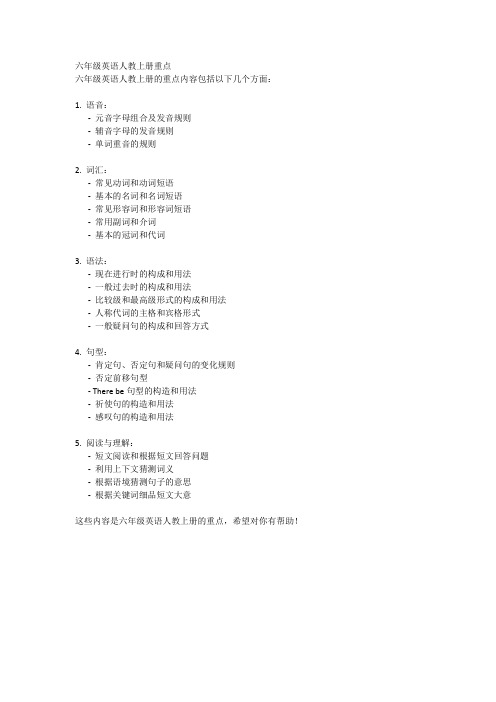
六年级英语人教上册重点
六年级英语人教上册的重点内容包括以下几个方面:
1. 语音:
-元音字母组合及发音规则
-辅音字母的发音规则
-单词重音的规则
2. 词汇:
-常见动词和动词短语
-基本的名词和名词短语
-常见形容词和形容词短语
-常用副词和介词
-基本的冠词和代词
3. 语法:
-现在进行时的构成和用法
-一般过去时的构成和用法
-比较级和最高级形式的构成和用法
-人称代词的主格和宾格形式
-一般疑问句的构成和回答方式
4. 句型:
-肯定句、否定句和疑问句的变化规则
-否定前移句型
- There be句型的构造和用法
-祈使句的构造和用法
-感叹句的构造和用法
5. 阅读与理解:
-短文阅读和根据短文回答问题
-利用上下文猜测词义
-根据语境猜测句子的意思
-根据关键词细品短文大意
这些内容是六年级英语人教上册的重点,希望对你有帮助!。
人教版小学六年级英语上册知识点总结和复习要点
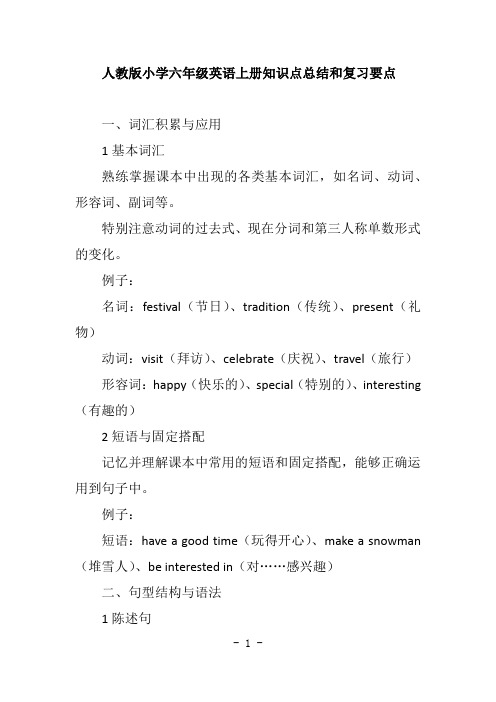
人教版小学六年级英语上册知识点总结和复习要点一、词汇积累与应用1基本词汇熟练掌握课本中出现的各类基本词汇,如名词、动词、形容词、副词等。
特别注意动词的过去式、现在分词和第三人称单数形式的变化。
例子:名词:festival(节日)、tradition(传统)、present(礼物)动词:visit(拜访)、celebrate(庆祝)、travel(旅行)形容词:happy(快乐的)、special(特别的)、interesting (有趣的)2短语与固定搭配记忆并理解课本中常用的短语和固定搭配,能够正确运用到句子中。
例子:短语:have a good time(玩得开心)、make a snowman (堆雪人)、be interested in(对……感兴趣)二、句型结构与语法1陈述句复习并巩固陈述句的基本结构,能够正确构建和表达完整的句子。
例子:陈述句:I like playing football in the afternoon.(我喜欢下午踢足球。
)2疑问句学习和掌握特殊疑问句、一般疑问句及其回答方式,能够准确理解并回答问题。
例子:特殊疑问句:What do you usually do on your birthday?(你生日通常做什么?)回答:I usually have a birthday party with my friends.(我通常和朋友们一起举办生日派对。
)3祈使句巩固祈使句的基本用法,能够正确使用祈使句表达请求、命令或建议。
例子:祈使句:Please don’t forget to bring your homework tomorrow.(请别忘了明天带作业来。
)4时态复习并巩固一般现在时、一般过去时、一般将来时和现在进行时等时态的基本用法和形式。
例子:一般现在时:She often reads books after dinner.(她晚饭后经常看书。
)一般过去时:We went to the zoo last weekend and saw many animals.(我们上周末去了动物园,看到了很多动物。
小学人教版六年级英语上册复习要点

小学人教版六年级英语上(Shang)册复习要点Unit1 How can I get there?一(Yi)、重点单词:地(Di)点:science museum科学(Xue)博物馆 post office 邮局 bookstore 书店cinema 电影院 hospital 医院动(Dong)作:go straight 直(Zhi)走 turn left/right 左转、右转方(Fang)位: in front of :在(Zai)···前面 behind 在···后面near在…旁边 next to 紧挨着 beside 在旁边over 在…上方 on the left 在左边 on the right 在右边二、重点句型:(1)Is / Are there…?某处有某物吗?肯定回答:Yes, there is/are. 否定回答:No, there isn’t/aren’t.(2)Where is the + 地点? ... ... 在哪里?It’s + 表示地点的名词. 它... ...例句:Where is the cinema? 电影院在哪?It’s next to the bookstore. 在书店的旁边。
(3)How can + 主语+get(to)+ 地点? ... ...怎么到... ...?(如果get后面接的词为副词,则要省略介词to.)例句:How can we get to the park?How can we get there? 我们怎么到那儿?同义句型:Can you tell me the way to + 地点?( 4 )Where is + 地点? Which is the way to + 地点?( 5 ) Turn left at the bookstore. 到书店左转。
Unit 2 Ways to go to school?一、重点单词/短语:交通方式:by bike /bus /plane /subway /train /ship /taxi /ferry骑自行车/乘公共汽车/飞机/地铁/火车/船/出租汽车/轮渡take the No.57 bus 乘57路公共汽车on foot 步行其他:slow down慢下来 pay attention to 注意 traffic lights 交通信号灯 look right 向右看 cross the road 横穿马路 at home 在家二、重点句型:(1)How do you + 地点?你们怎么来... 的?I usually/ often/sometimes .. ... 我通常/经常/有时...How do you go(to) + 地点?你们怎么去...的?How do you get (to) + 地点?你们怎(Zen)么到达...的?(频度副词:频度副词又称频率副词,用来表示事情发(Fa)生的频率,即某事多主语 + must + 动词原(Yuan)形 + (其它)(must和(He)can, should一样都是情态动(Dong)词,must意(Yi)思是“必(Bi)须”,语气很强烈,没有人称和数的变化,后面接动词原形。
小学人教版六年级英语上册复习要点

六年级上册复习要点Unit1 How can I get there?一、重点单词:地点:science museum科学博物馆post office 邮局bookstore 书店cinema 电影院hospital 医院动作:go straight 直走turn left/right 左转、右转方位:in front of :在···前面behind 在···后面near在…旁边next to 紧挨着beside 在旁边over 在…上方on the left 在左边on the right 在右边二、重点句型:(1)Is / Are there…?某处有某物吗?肯定回答:Yes, there is/are. 否定回答:No, there isn’t/aren’t. (2)Where is the + 地点?... ... 在哪里?It’s + 表示地点的名词. 它... ...例句:Where is the cinema? 电影院在哪?It’s next to the bookstore. 在书店的旁边。
(3)How can + 主语+get(to)+ 地点? ... ...怎么到... ...?(如果get后面接的词为副词,则要省略介词to.)例句:How can we get to the park?How can we get there? 我们怎么到那儿?同义句型:Can you tell me the way to + 地点?( 4 )Where is + 地点?Which is the way to + 地点?( 5 ) Turn left at the bookstore. 到书店左转。
Unit 2 Ways to go to school?一、重点单词/短语:交通方式:by bike /bus /plane /subway /train /ship /taxi /ferry骑自行车/乘公共汽车/飞机/地铁/火车/船/出租汽车/轮渡take the No.57 bus 乘57路公共汽车on foot 步行其他:slow down慢下来pay attention to 注意traffic lights 交通信号灯look right 向右看cross the road 横穿马路at home 在家二、重点句型:(1)How do you come (to) + 地点?你们怎么来... 的?I usually/ often/sometimes .. ... 我通常/经常/有时...How do you go(to) + 地点?你们怎么去...的?How do you get (to) + 地点?你们怎么到达...的?(频度副词:频度副词又称频率副词,用来表示事情发生的频率,即某事多长时间发生一次。
- 1、下载文档前请自行甄别文档内容的完整性,平台不提供额外的编辑、内容补充、找答案等附加服务。
- 2、"仅部分预览"的文档,不可在线预览部分如存在完整性等问题,可反馈申请退款(可完整预览的文档不适用该条件!)。
- 3、如文档侵犯您的权益,请联系客服反馈,我们会尽快为您处理(人工客服工作时间:9:00-18:30)。
Unit 1 HOW Can I get there ?一、主要单词:museum博物馆bookstore书店Cinema电影院turn转弯hospital医院left向左post OffiCe 邮局SCience科学right 向右Straight笔直地crossing十字路口二、习惯语搭配:post OffiCe 邮局SCie nce museum科学博物馆Pet hospital 宠物医院ItaIia n restaura nt 意大禾U馆Beihai Park北海公园PaIaCe MUSeUm故宫博物院go Straight直走turn right/left 右/左转next to 挨着in front of...在...前面near the Park在公园附近on Dongfang Street在东方大街上三、惯用表达式:EXCUSe me 打扰一下Follow me, PIeaSe 请跟着我!四、公式化句型:1、问路的句型及其答语:问句:Where isthe +地点?••在哪儿?答语:It ' S表示地点的词语。
它…。
n ext to the bookstore, n ear the hospital/post office, over there,on DOngfan gStreet, in front of the school...2、询问怎么到某地的句型及其答语:问句:How can +主语+ get (to)+地点?••怎么到• • •?同义句型:Can you tell me the Way to +地点?Where is + 地点?WhiCh is the Way to + 地点?答语:TUrn +方向+表示地点的介词短语。
••转。
at the Cin ema at the COrner n ear the post OffiCe…五、例句:Where is the Ci nema, please? 请问电影院在哪里?It's n ext to the hospital. 它与医院相邻。
TUrn left at the Cinema, then go straight. ItS on the left.在电影院向左转,然后直行。
它在左边。
TUrn left at the bank。
在银行左转。
六、主题写作:范文Unit 2 WayS to go to school一、主要单词:by乘bus公共汽车on foot步行plane飞机taxi出租车ShiP (大)船SUbWay地铁train火车slow 慢的stop停下always 总是,一直usually 通常often经常SOmetimeS 有时候never 从来不二、习惯语搭配:by bike/bus/pla ne/subway/trai n/ship/taxi/ferry骑自行车/乘公共汽车/飞机/地铁/火车/船/出租汽车/渡轮take the No.57 bus乘57 路公共汽车on foot 步行slow down 慢下来Pay attention to注意traffic IightS 交通信号灯look right 向右看cross the road横穿马路get off 下车at home在家traffic rules交通规贝U get to至U达get on上车be far from∙∙∙表示离某地远三、惯用表达式:Wait !等一等!Hooray 太好了!I see.我明白了。
Go at a green light 绿灯行Stop at a red light 红灯停Wait at a yellow light 黄灯等四、公式化句型:1、如何询问对方的出行方式:HOW do you come (to )+地点? 2、 如何用must 表示必须做某事: 某人+must+动词原形(+其它). 3、 告诫别人不要做某事的句型:Don' t 动词原形(+其它).五、例句:How do you go to school? 你怎么去上学?Usually I go to school on foot. SOmetimeS I go by bus. 通常我步行去上学。
有时候骑自行车去。
How Can I get to Zhon gshan Park ?我怎么到达中山公园? You Can go by the No. 15 bus. 你可以坐15路公共汽车去。
I am far from school now. 我现在离学校很远。
My home is not far from our school. = My home is n ear our school. 我家离学校不远。
六、主题写作:范文Unit 3 My Weeke nd pla n一、 主要单词:tomorrow 明天 film 电影 SUPermarket 超市 trip 旅行 tonight 在今晚 evening 晚上/傍晚 next Week 下周 comic 连环画杂志 dictionary 词典 word 单词 post Card 明信片 ViSit 拜访二、 习惯搭配:take a trip 去旅行 go for a PiCnic 去野餐 go to the Cinema 去看电影 learn to SWim 学习游泳ViSit my grandparents 看望我(外)祖父母 get together 聚会 go to the SUPermarket ⅛超市 go ice-skati ng 去滑冰 make a sno Wman 堆 雪人 See a film 看电影 make moon Cakes 做月饼read a poem 朗 诵一首诗 this Weeke nd 这周末 Renmin Park 人民公园 n ext Week 下周this morni ng/afterno on /eve ning 今天上午 / 下午 / 晚上 n ext Wedn esday 下星期三三、 惯用表达式:1、 询问对方打算做什么的句型及其答语:问句:What are you going to do +其它? 你/你们••打算做什么?n ext Week toni ght tomorrow this morni ng/afterno on /eve ning this Weeke nd...答语:I ' m/we re going tc 动词(短语)原形+其它. 我/我们打算…。
See a film take a trip ViSit my gran dpare nts WatCh TV...2、 询问对方打算去哪儿的句型及答语:问句:Where are you going (+将来时间)?答语:I ' m/We IglDing (to the )+地点.3、 询问对方打算何时去做某事的句型及答语:问句:When are you going to +动词(短语)原形?你/你们打算什么时候 …? 答语:I ' m/We going to +动词(短语)原形+将来时间.我/我们打算…。
五、例句:What are you going to do on the Weeke nd? 你周末打算做什么?I'm going to ViSit my gran dpare nts this Weeke nd? 这个周末我打算去看望我的外祖父母。
Where are you going this after noon? 你今天下午打算去哪里?I'm going to the bookstore.我打算去书店。
What are you going to buy?你打算去买什么?你(们)怎么来…的?••必须••.不要/别…。
What about you?尔呢? Can I help you?我能帮助你吗?HaVe a good time 玩得开心!Here they are 它们在这儿!Sou nds great 听起来很棒! You too.你也是 你/你们打算(••去哪儿? 我/我们打算去••I'm going to buy a comic book 。
六、主题写作:范文 Let ' HaVe a NiCe Day!Today is Saturday.Tomorrow morning I ' m gc⅛mghe bookstore With my friends. We are going to look for some good books. We all like readi ng books. We are going to have IunCh in a restaura nt. I like ChiCke n, beef and vegetables. After IUn ch, We are going to the SUmmer PaIaCe by bus. We are going to play n ear theKUnming Lake. Maybe We are going to row a boa (戈U 船) on the lake. That will be great! We areCOming back at 5 in the after noon.Unit 4 I have a Pen pal一、 主要单词:StUdieS 学习(第三人称单数形式 PUZZIe 谜 hiking 远足Pen pal 笔友hobby 业余爱好Share 分享 idea 想法,主意amazing 令人惊奇的shall 表示征求意见goal 射门join 加入club 俱乐部二、 习惯搭配:read StOrieS 读故事 do kung fu 练功夫 fly kites 放风筝 play the PiPa 弹琵琶 play SPOrtS 进行体育活动 climb mountains 爬山 liste n to music 听音乐Sing English songs 唱英文歌 on a farm 在一个农场里 live in...住在 …Write an email to...给••写一圭寸电子邮件 on the PIaygrOUnd 在运动场上三、 惯用表达式:Me too.我也是。
Really?真的吗?四、 公式化句型:1、 询问某人爱好的句型及其答语:问句:What are sb. ' S hobbies? 答语:主语+like/likes+动词-ing 形式(+其它). Singing dancing reading StOrieS playing football WatChing TV drawing cartoons listening to music 2、 由do/does 引导的一般疑问句及其答语: 问句:Do/Does+主语+动词原形+其它?答语:(肯定回答)Yes,主语+do/does. / (否定回答)五、语法: 1、 动词变为动名词的规则:动词变为动名词,即是动词加-ing 。
